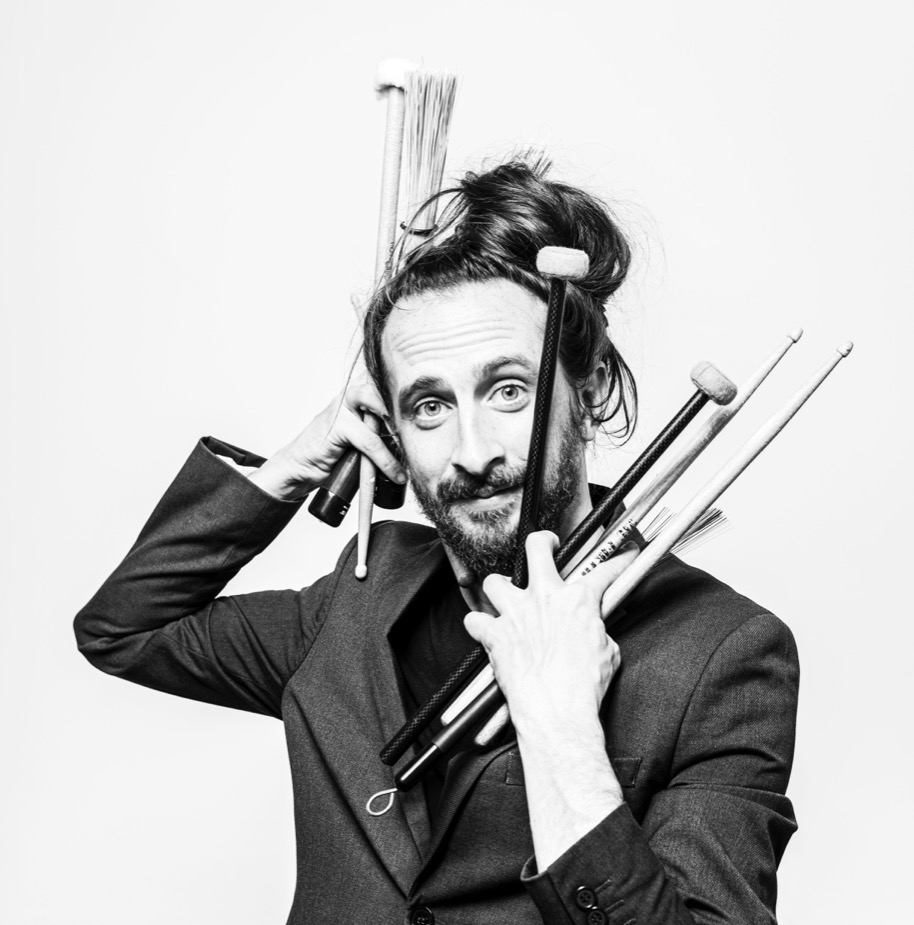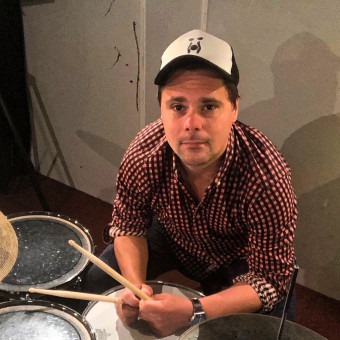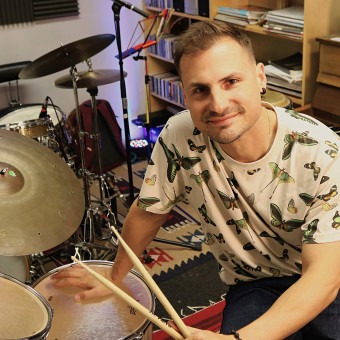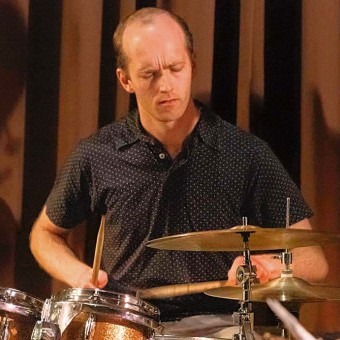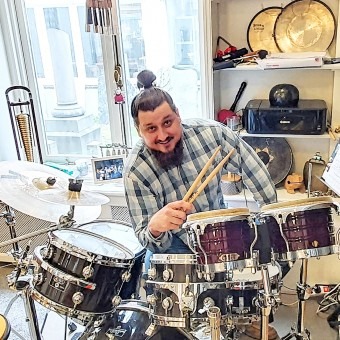Music Teachers - Drums
About Drums lessons
What's so cool about drumming?
Drumming is as old as humanity; it gives energy when you play it and also when you listen to it. You can hardly sit still when someone is drumming nicely or when you experience the vibes of someone Djembé playing, right?
A little history
There is hardly a place on earth where drumming is not the heartbeat of the music. The most diverse percussion instruments were used to communicate over a long distance, to scare the enemy during wars, to drive away ghosts, celebrate religious ceremonies or to make music to dance to.
Is it difficult to learn the drums?
If you have a sense of rhythm and feel good about yourself, you can quickly master the basics of drumming. You can go as far as you want with drumming. From playing cool beats in your favourite music style to training your technique to the top and learn to play the most complex fills and solos! You decide!
What is important when you start?
In addition to a sense of groove, drive and swing, tempo stability, good physical fitness, creativity and a sense of structure are important. Of course, this applies to every musician, but certainly to drummers!
Is reading drum notation difficult?
Being able to read drum notation well gives you the advantage of learning songs and exercises faster and enables you to lay in an orchestra or in a big band. It is not hard to learn.
Can you play solos as a percussionist?
Absolutely! Every form of percussion, and therefore also a drum kit, lends itself to rousing and complex rhythms, creative combinations of various sounds, intense solos or poetic and subtle improvisations!
Who is the best drummer?
Listen to famous drummers such as Billy Cobham, Mike Portnoy, John Bonham, Art Blakey, Buddy Rich, Elvin Jones, Roy Haynes, Tony Williams, Bernard Purdie, Steve Gadd, Mike Clark, Butch Miles, Danny Richmond, Zakir Hussain, Cesar Zuiderwijk or Charlie Watts and make your own (provisional) choice!
What are brushes?
Brushes are spring-shaped telescopic (often steel) brushes with which you can play ballads and slow songs beautifully, but also up-tempo swinging shuffles. Think of Gene Krupa, Art Taylor, Elvin Jones and many other great jazz drummers!
What are drumsticks made of?
Many drumsticks are made of American Hickory. A tree with the botanical name Carya, family of the Walnut. A resilient, tough wood that is used for hammer handles, axes and the best drumsticks.
What determines which sticks you choose?
There are sticks with wooden tips, oval and round, heavy and light, thick and thin, with nylon tips and just like with cymbals there is a huge choice. Which stick feels best and sounds best is personal and differs per situation. Before you know it you have a bag full!
What are the best drumsticks for beginners?
The better your playing technique, the clearer it becomes which stick you prefer to use for which piece. Experience will teach you!
What should you pay attention to when choosing sticks?
A lighter stick (such as a 5A) provides a nice balance, light playing, clear articulation and speed, while thicker sticks (such as a 2B or 5B) are better if you like to play with a lot of volume and hit hard. Thicker sticks give more power and last longer. In any case, every stick has its own sound and feel. One stick suits the type of music you are going to play better than another.
What is a drum kit?
A drum kit is another word for drum set. Your kit has drums in all kinds of sizes and pitches. Usually, your drums can be tuned to a certain pitch, so that they sound good together. Your drum set usually consists of a bass drum, a snare, tom-toms and a floor drum. In addition, you have a high-hat and several cymbals.
What material is used for cymbals?
Cymbals are made of a certain alloy of metals. Brass, steel, bronze. The alloy your cymbals are made of has a big influence on the sound. Most professional models are made of a bronze alloy with 20% tin. This alloy is called B20.
How many types of cymbals are there?
There are endless variations on the market. Each cymbal has its own sound. High, clear, crash, rustling, (sizzle). Some have a long resonance; others have a short resonance. The sound and pitch of your cymbal is determined by the size, thickness, alloy, bell, tension, shape and profile.
What are well-known brands of cymbals?
The brands Paiste, Zildijan, Stagg, Fazley, Meinl, Sabian, Istanbul offer high-quality cymbals and many different sounds.
Why different types of cymbals?
The differences in sound of your cymbals allow you to make interesting combinations in solos and vary the sound of your band. You can use different cymbals to add accents to your sound profile and you can change sounds endlessly if you have many cymbals.
What is a high-hat?
A high-hat is a stand with a foot pedal, with which you can make two cymbals come together. This requires a special technique. A high-hat is standard with every drum set. There are different types and sizes and the sound of your high-hat depends on the choice of your cymbals.
Why do many drummers have a large collection of instruments?
The better you get at drumming, the more critical, creative and demanding you become. You are going to build a collection of drums and cymbals, so that you can make exactly the right sound that you are looking for at that moment. The sky is the limit!
In which music do you play percussion?
Percussion instruments are played in jazz, pop, rock, folk, soul, funk, classical percussion or all kinds of world music, such as Salsa, Brazilian, Afro, Latin, Hindustani, Turkish, Arabic or Asian.
What are well-known percussion instruments?
Percussion instruments are timpani, tabla, claves, bongos, cow bell, congas, taiko, djembe, cajon, gong, gamelan and countless more! You can beat rhythms on anything, even drumming on your body sounds great! Check Cesar Zuiderwijk’s solos body percussion! Countless fantastic musicians have made their mark as percussionists, including Paulinho, Tito Puente, Candido, Zakir Hussein, Tarang Poddar, Konstantyn Napolov, Ray Barretto or Steve Berrios.
What are melodic percussion instruments?
Melodic percussion instruments such as marimba, balafon, xylophone and vibraphone are regularly used in world music, jazz and contemporary classical music. In addition to a rhythmic function, percussion can also have a melodic function.
Are marimba or vibraphone difficult to learn?
When you are at home on a piano and understand the structure of your keyboard, you can quickly play chords and melodies on a marimba or vibraphone. The marimba and vibraphone have the same structure as a piano. You just don't have keys that strike the strings of the piano but sticks or mallets to play the keyboard with.
More information
Op zoek naar een leuke muziekleraar die drumlessen geeft?
Bekijk de pagina van de drumleraar in jouw buurt en boek meteen een proefles! Na je proefles kun je direct met je drumlessen beginnen!
Met muzieklessen beginnen en zoek je een gratis proefles?
Gevonden! De proefles kost 25,-euro, maar dat krijg je terug, als korting, bij de aanschaf van je eerste Strippenkaart van 5 of 10 Drumlessen! Wel zo eerlijk!
Muzieklessen bij jou in de buurt
Neem via deze site contact op met een fantastische privé drumleraar in jouw buurt. Je merkt al snel hoe een conservatorium gediplomeerde muziekdocent je inspireert, motiveert en verder helpt op je muzikale pad!
Muzieklessen voor jong en oud!
Bij Vivaldi Music Lessons vind je alle soorten muzieklessen en zanglessen voor beginners en gevorderden. Muziek maken is gezond en leuk, voor kinderen jongeren en volwassenen.
Je instelling is belangrijker dan je niveau!
Het maakt niet uit of je nog nooit actief met muziek bent bezig geweest en voor het eerst drumlessen gaat nemen, of dat je vergevorderd bent en bij een professionele en ervaren docent je kennis van muziek wilt verbreden en je vaardigheden wilt ontwikkelen en perfectioneren. Voor je docent is je instelling belangrijk, maar maakt je niveau niet uit!
Drumles, alles op een rijtje
- Privéles voor het beste resultaat
- Strippenkaarten van 30, 45 of 60 minuten
- Gratis proefles bij aanschaf van je 1e strippenkaart (normaal 25,-)
- muziekles bij de docent of bij jou aan huis
- Online lessen mogelijk
- Gezellige en positieve sfeer in je les, zodat je er altijd met plezier naar toe gaat.
- Lees hier hoe anderen hun muzieklessen ervaren!
Muziekles Cadeaubon
Zoek je een origineel en waardevol geschenk? Geef 3 drumlessen cadeau!
Choose your Drum teacher
Congratulations! Your next step is to check out the page of the music teacher you want to know more about. Get in touch with the drum teacher in your area and book a trial lesson!
Trial Drum Lesson
The trial lesson is the perfect situation to discuss the frequency of the lessons, the location, the music styles you like most or other styles you may wish to explore and to get to know your future drum teacher. Book your first lesson pack, and receive a free trial lesson. (Normal price EU 25,- )
Private Music Lessons For All Ages
At Vivaldi Music Lessons website you will find all types of music lessons for beginners and advanced. Instrumental and vocal music lessons for children, teenagers and adults.
Why Music Lessons?
Music lightens your mood, cheers you up, gets you moving and gives you positive energy! Making music is one of the most motivating and healthy activities in life!
Your Favourite Music
The repertoire for drums which you find the most personal to you is where we will focus our attention. For this, constructive feedback, personalised exercises, tips and inspiration from a dedicated professional drum teacher are best choice!
Drum Lessons near you!
- Drum Lessons for children, teenagers, adults - all levels
- Flexibility with Lesson Packs of 5 or 10 x 30, 45 or 60 minute lessons
- Free trial lesson with the purchase of a Lesson Pack (normally 25,-)
- Private drum lessons at the teacher's place or at your home
- In person or online lessons
- Cosy and positive atmosphere in your lessons
Lesson Packs
Lesson time, payment of the lessons and location are arranged individually between you and your drum teacher. Packs of 5 or 10 drum lessons of 30 minutes, 45 minutes, and 60 minutes.
Lesson Locations
The Drum Lessons will take place at the teacher's place or studio or in the comfort of your own home.
Online Drum Lessons
If you wish to follow online lessons, you can contact the drum teacher of your choice directly and discuss the possibilities.
Classical to Pop and More!
If music is your passion and classical, baroque, jazz, pop, latin, world music or any other kind of music is where you find the most inspiration, you're welcome to sign up for a trial drum lesson.
Music Theory Lessons
Do you wish to know more about the backgrounds of music? Learn more about harmony, tonalities and musical structures? Find your drum teacher and discover the advantages of knowledge of music theory.


